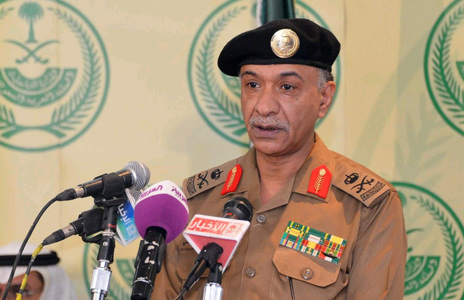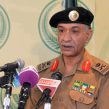
Saudi Security Forces Crack Down on al-Qaeda and Islamic State
Publication: Terrorism Monitor Volume: 12 Issue: 20
By:

A U.S. citizen working for Vinnel Arabia, an American defense contractor, was shot dead and another wounded at a gasoline station in eastern Riyadh, Saudi Arabia on October 14 (Bloomberg Businessweek, October 14). The Saudi Arabian Embassy in Washington, D.C. issued a statement identifying the assailant as 25-year-old Abdul Aziz Fahad Abdul Aziz al-Rashid, who has dual Saudi-American citizenship. Initial investigative reports suggest that al-Rashid was dismissed from his job at Vinnel Arabia “due to drug related issues,” and has no links to extremism. [1] Yet, the attack raised fears reminiscent of al-Qaeda’s terrorist attacks inside the Saudi Kingdom from 2003 to 2005.
The threat of terrorist attacks may again be likely as Saudi Arabia – along with three Gulf state allies and Jordan – has joined the U.S.-led coalition against the Islamic State organization, previously the Islamic State of Iraq and Syria (ISIS). In order to crack down on possible terrorist activity inside the Kingdom, the Saudi government has taken several drastic domestic anti-terror measures in the past several months by galvanizing and coordinating legal, security and religious institutions in the country against any form of political and religious dissent.
The efforts made by the Saudi government against terrorism during this year alone demonstrate that the regime is alert to the threat of religious dissent. On February 1, a new and controversial “anti-terror” law came into effect in response to a decree by King Abdullah al-Saud. The law includes 41 articles that authorize the Interior Minister to prosecute anyone who “undermines” the state or society as an act of terror (Independent, February 3). It is worth mentioning that the law also punishes any Saudi national proven to have fought in a jihadist group outside the Kingdom with three to 20 years of jail time. Working under this legal framework, the Ministry of Interior is now authorized to monitor social network websites as well as arrest and detain suspects linked to terrorist activity, expressions of sympathy with any terrorist organization or encouragement of youths to fight abroad.
Shortly after this law came into effect – on March 7 to be exact – the Saudi government followed Egypt in labeling the Muslim Brotherhood as a terrorist organization (al-Arabiya, March 7). The list of “terror” groups published by the Saudi Ministry of Interior also includes “al-Nusra Front, which is al-Qaeda’s official Syrian affiliate, and ISIS,” as well as Shi’ite militant groups, the Saudi Hezbollah and Houthi rebels in Yemen (al-Arabiya, August 26).
While the Interior Ministry indicated the list will be periodically updated, no terror groups have been added in seven months. Nevertheless, a series of arrests show that the groups linked to the Islamic State and al-Qaeda have revived their activities inside the Kingdom and the Interior Ministry is working to eliminate this threat from within.
On September 2, Interior Ministry spokesman Major General Mansour al-Turki announced that the security forces have arrested 88 suspects; of those, 83 are Saudi nationals, three are Yemenis and one has yet to be identified (BBC, September 2). These individuals had established ten terrorist cells throughout the Kingdom and were plotting a series of attacks and assassinations inside and outside the country (al-Arabiya, September 2). This announcement came two weeks after an Interior Ministry statement indicated that eight citizens were arrested due to their involvement in recruiting youths to “extremist groups abroad” (al-Arabiya, August 26). Media reports confirmed that the recruitment group was indeed for the Islamic State organization.
These two nearly simultaneous arrests were not the first to reveal connections to the Islamic State organization. Earlier in May, Major General al-Turki confirmed the apprehension and dismantlement of the first ISIS cell inside the Kingdom, which peculiarly maintained communications and coordination with al-Qaeda in Yemen and “other deviant groups in Syria and other misguided elements in a number of regions of the Kingdom of Saudi Arabia” (al-Sharq al-Awsat, May 7). This Islamic State-affiliated group consisted of 62 suspects, including 35 Saudi nationals who had been previously imprisoned on similar terror charges before they were released by a court order. The amir of this terror cell was among those apprehended, according to al-Turki.
The significant security measures and the legal framework the Interior Ministry uses are not the only steps the Saudi regime has taken. A few weeks after Abu Bakr al-Baghdadi proclaimed himself as the caliph of the self-declared Islamic State on June 29, King Abdullah publicly scolded Saudi religious scholars for their silence on the Islamic State organization’s abuse of Islam (al-Arabiya, August 10). A few days later, Grand Mufti (chief Islamist jurist and, in this case, the head of the Saudi religious establishment) Shaykh Abdel Aziz al-Shaykh said that the Islamic State organization is “Islam’s number one enemy” (al-Arabiya, August 19). He later added a fierce but implicit condemnation of the militant group during the main sermon of the annual hajj pilgrimage on October 3. The mufti called on Islamic leaders to “hit with an iron hand the enemies of Islam.” In his address to more than 2 million pilgrims, he referred to those affiliated with “deviated groups” as criminals, tyrants, rapists and murderers and said that these individuals threaten religion itself and the security of Muslims as a whole (al-Arabiya, October 4).
The Saudi Arabian government is not taking the rise of the Islamic State organization lightly. While geographical space may separate the physical Islamic State from Saudi Arabia, internal religious dissidents show some connections to the Islamic State organization and possibly some coordination with al-Qaeda’s affiliate in Yemen. Therefore, from the Saudi regime’s perspective, it is crucial to allocate all available resources to counter internal terrorism as strongly as those devoted to its war against external violent extremism.
Zaina Konbaz is currently a research assistant at the Middle East Institute (MEI).
Note
1. “Shooter Arrested in Riyadh for Death of American Citizen,” Royal Embassy of Saudi Arabia, October 14, 2014, https://saudiembassy.net/latest_news/news10141401.aspx.





